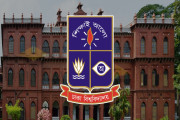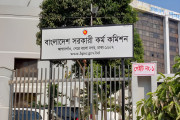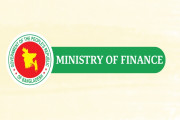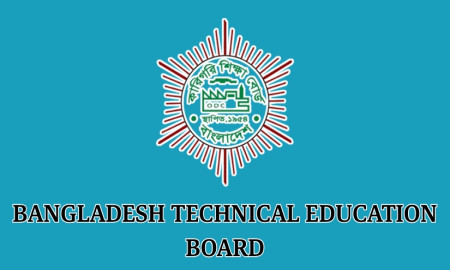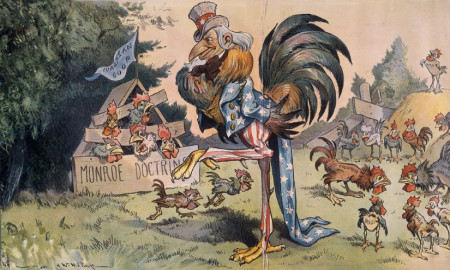Meritorious Students Deprived of University Admission Despite Passing Due to Ward Quota

The passing marks in public university admission tests are typically 30 or 40. Most universities conduct exams for 100 marks. Some candidates fail to secure even these marks. However, among them, certain students gain admission to the country’s top universities. They are facilitated by the controversial “Ward Quota.” These students, related to university lecturers or employees, secure admission despite failing the test through this quota.
In contrast, up to 70 general students compete for a single seat in public universities. This situation has raised questions about the ward quota from all quarters. Opposition to the ward quota has also come from deputy commissioners (DCs). The University Grants Commission (UGC) is not in favour of this quota either. Despite this, top universities have continued the ward quota unabashedly, ignoring all concerns.
Investigations revealed that a student gained admission under the ward quota because he was the brother of an assistant professor at a university. Meanwhile, many students with much better results were denied admission.
According to information obtained from various universities, in the 2021–22 academic year alone, approximately 700 students were admitted under the ward quota across 25 universities. The highest number of admissions occurred in four autonomous universities. Rajshahi University admitted 127 students, Chittagong University 155, Jahangirnagar University around 50, and Dhaka University 43 students under the ward quota.
Among the students admitted under the ward quota at Rajshahi University, 60 had failed the admission test. They did not even secure the minimum passing mark of 40. The university administration stated that, subject to vacant seats in the ward quota, the minimum passing mark was reduced to 30.
According to calculations, although 201 students were eligible for admission under this quota, only 67 qualified with the minimum passing mark of 40. After lowering the passing mark, an additional 60 students gained admission.
Previously, in the 2019–20 academic year, Rajshahi University admitted 46 students under the ward quota who failed to secure the passing mark, and in the 2020–21 academic year, 40 such students were admitted. In other universities, Jahangirnagar University reduced the passing mark from 40 to 33 for quota candidates. At Sher-e-Bangla Agricultural University, part of the agricultural cluster, the passing mark is 40, but for the ward quota, it is 25. At Shahjalal University of Science and Technology, ward quota candidates can be admitted with 10 marks less than the lowest-scoring general student. Additionally, Noakhali Science and Technology University, part of the cluster system, issued a notice reducing the passing mark from 30 to 25 for quota candidates.
This year, Rajshahi University has allocated 537 seats for special quotas. The university’s vice-chancellor, Professor Dr. Golam Sabbir Sattar, announced this at a press conference. It is known that 12% of the total seats at Rajshahi University have been reserved for quotas this year. These include 61 seats for ethnic minorities, 122 for physically disabled individuals, 5% of seats in each department and institute for children and grandchildren of freedom fighters, 4% of seats in each department and institute for children of lecturers, officers, and employees, and 10% of seats in the Physical Education and Sports Department for the BKSP quota.
However, Rajshahi University’s Vice-Chancellor, Professor Dr. Golam Sabbir Sattar, said that no one will be admitted this year without meeting the designated passing mark. Compared to last year, the ward quota has been reduced by 1% this year. Last year, due to unfilled quota seats, admissions were made based on special recommendations from the admission test committee and subcommittee. This opportunity will not be available this year. Students must pass to secure admission.
The university’s pro-vice-chancellor, Professor Dr. Sultan-Ul-Islam, said, “The ward quota has been in place for a long time. Abruptly abolishing it could have negative consequences. It is not just our university that has a ward quota. Many public universities and institutions still have it. We do not admit quota candidates by depriving any non-quota students. Based on student demands, we have reduced the ward quota to 4% this year. In the future, it may be further reduced based on decisions by the admission test subcommittee.”
When asked whether the 1973 policy mentions anything about the ward quota, he said, “No, there is nothing like that. In fact, many things are not in this policy or may not be. We have had to change many things as per necessity. For example, changes have been made to the admission test. However, I hope the university’s policies will gradually be reformed properly to align with students’ demands.”
When asked if failed students would be admitted under the ward quota this year, as in the previous year, he said, “Last year, the admission test subcommittee had 30 members. Based on everyone’s opinions, the passing mark was reduced from 40 to 30. However, this time, such an opportunity will not be given without passing. We have discussed this matter.”
In contrast, a recommendation was made to abolish the ward quota in examinations, like the recruitment of assistant teachers in government primary schools. DCs made this recommendation ahead of the Deputy Commissioners’ Conference in Dhaka. It is known that since October 2018, the government has abolished quotas for grades 9 to 13 in public service recruitment. However, for primary teacher recruitment, there is a 60% quota for women, a 20% ward quota, and a 20% quota for men.
Regarding this, the DC of Kurigram stated in his proposal that there is a ward quota in the recruitment of teachers for government primary schools. As a result, less qualified candidates are being appointed as teachers despite the availability of more competent candidates. This reduces the quality of teaching, increases the number of jobholders in the same family, and deprives poor and meritorious candidates. The government’s policy of ensuring employment in every family is also being undermined.
Education stakeholders say that admitting students under the ward quota in this manner is damaging the quality of education and creating inequality. Moreover, allegations of irregularities in ward quota admissions are not uncommon. Such controversial activities are undesirable in the country’s highest educational institutions.
On this issue, Professor Dr. Md. Taher, former treasurer of Chittagong University and a member of the UGC, said, “The Constitution specifies who can benefit from quotas. There is no mention of a ward quota there. On what basis, then, are universities maintaining this quota? In my opinion, there is no justification for this quota.”
Professor Md. Alamgir, former vice-chancellor of Khulna University of Engineering and Technology and another UGC member, said, “Why do lecturers’ children need a quota? Are they falling behind? Or are lecturers providing services to universities for free? Universities are obliged to provide equal opportunities to everyone. But this type of quota creates discrimination against general students. We have recommended from the University Grants Commission that this quota be abolished.”
Notably, undergraduate admission processes are currently ongoing in 43 public universities in the country. Of these, 25 universities have a ward quota. The remaining universities—Bangladesh University of Engineering and Technology, Bangladesh Agricultural University, Rajshahi University of Engineering and Technology, Chittagong University of Engineering and Technology, Khulna University of Engineering and Technology, Dhaka University of Engineering and Technology, Bangladesh Textile University, Bangladesh University of Professionals, Khulna University, Bangabandhu Sheikh Mujibur Rahman Agricultural University, Sylhet Agricultural University, Chittagong Veterinary and Animal Sciences University, Khulna Agricultural University, Habiganj Agricultural University, Bangabandhu Sheikh Mujibur Rahman Maritime University, and Bangabandhu Sheikh Mujibur Rahman Aviation and Aerospace University—do not have a ward quota.

